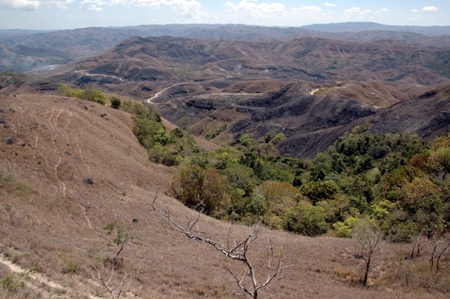Addressing water catchment and erosion processes are vital to sustainable
livelihoods in much of the heavily deforested and burnt landscapes in eastern
Indonesia, as here on the island of Sumba (Photo courtesy of Jeremy Russell-Smith)
Indigenous peoples from the rim of the Arafura Sea – eastern Indonesia, Timor Leste, Papua New Guinea, and northern Australia – are pooling their expertise to develop options for making livelihoods from their traditional lands by tapping into ecosystem services that are evolving from attempts to lessen the effects of climate change.
They attended a workshop hosted by one of TERN’s facilities, the Australian Centre for Ecological Analysis and Synthesis (ACEAS), in Darwin in early May to explore the development challenges many indigenous communities face, and the opportunities that are available through payments for ecosystem services, including the United Nations’ Reducing Emissions from Deforestation and Forest Degradation (REDD) program and associated environmental benefits, known as REDD+.
Ecosystem services are benefits that natural environments provide humans, for example clean drinking water, shade, cultivable soils, the decomposition of wastes, and beautiful places people enjoy visiting and which revive the spirit or provide space for recreation.
The workshop involved more than 30 people, drawing together regional Indigenous representatives, with Australian and international ecosystems services researchers and institutional expertise. One of the drawcards was Dr Robert Costanza, who is the lead author of the seminal and much-cited paper ‘The value of the world’s ecosystem services and natural capital’, published in Nature in 1997, and the editor-in-chief of the journal Solutions.
The workshop is part of a project called ‘Ecosystem services and livelihood opportunities’, funded by ACEAS, TERN and the Institute of Advanced Studies of the United Nations University. The project also has organisational support from the North Australian Land and Sea Management Alliance and Charles Darwin University’s Research Institute for the Environment and Livelihoods.
Published in TERN e-Newsletter May 2012







